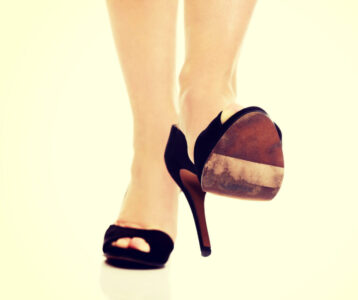 If you’re wearing high heels in the office or a fashionable elevated heel out on the town and then trade them in for a pair of running shoes when you want some exercise, you may find that the former are affecting your ability to enjoy your time in the latter.
If you’re wearing high heels in the office or a fashionable elevated heel out on the town and then trade them in for a pair of running shoes when you want some exercise, you may find that the former are affecting your ability to enjoy your time in the latter.
Research in the Journal of Applied Physiology decided to take a closer look at how wearing high heels affected the mechanics of walking and running. The results weren’t all that surprising in that they discovered that wearing high heels long-term ends up costing more energy and makes walking less efficient. However, they also found that it could increase injury rates and potentially causes problems for runners.
High Heel Use In Runners
When the heel is elevated like is standard with a high heel, the shoe doesn’t allow for ankle dorsiflexion. Ankle dorsiflexion is the movement that allows your shinbone to pivot over the foot. Because of this restriction, hip extension and stride length are limited, as is your ability to push off with your calf and gluteal muscles. And while you aren’t going for a run in your little red heels, the physical effects that you feel when you’re wearing them can linger long after you’ve switched out shoes.
These physical changes won’t happen overnight if you wear your heels out for a special occasion, but you do want to limit how much time your spend in an elevated heel. The more you wear high heels, the greater the likelihood that your walking and running mechanics will change over time, and they won’t change in a positive way. More energy will be needed to perform the action and you’ll become less efficient when moving, and that’s clearly going to cause problems if you’re a runner. Running will become more challenging and may even become uncomfortable or painful if you’re dealing with physical issues stemming from prolonged high heel use.
As we’ve recommended in previous blogs, Dr. Silverman isn’t someone who tells patients never to wear heels or never indulge in a dessert. Many different actions and lifestyle choices are fine in limited use, especially when paired with healthy choices that can counteract some of our sub-optimal choices. Wearing heels every once-in-a-while shouldn’t cause problems for your walking or running gait, but more regular use may mean you’ll be in Dr. Silverman’s office looking for a solution to your foot and ankle pain. Our advice is to limit your high heel use and choose a more comfortable and supportive shoe for more regular use.
For help with any shoe-related foot or ankle issues, we hope you’ll reach out to Dr. Silverman and the talented team at Resurgens Orthopaedics! Give our team a call today at (770) 475-2710.